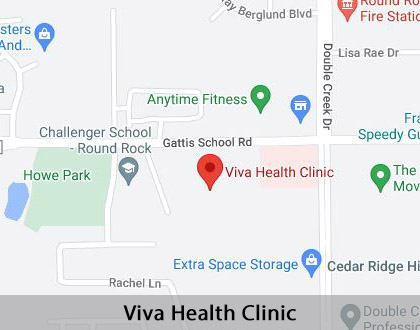Immunizations, Vaccinations & Flu Shots Round Rock, TX
Immunizations, vaccinations, and flu shots are essential for preventing harmful infections and diseases. Vaccinations help the body fight off and build up an immunity to certain viral and bacterial infections. While most people can fight off infections such as influenza without too much difficulty, developing such infections naturally can lead to discomfort and hurt your long-term health.
People can receive vaccinations and flu shots from a primary practitioner to build up their immunity. Our team at Viva Health Clinic in Round Rock and the surrounding area can determine which immunizations you need. Call us today at (512) 243-5872 to learn more about our services or schedule an appointment.
The Importance of Immunizations, Vaccinations, and Flu Shots
It is important to stay up to date on all necessary and recommended vaccinations. Our primary care practitioner helps determine whether patients are up to date on their shots, answer any questions about vaccinations, and administer any immunizations, vaccinations, or flu shots necessary.
According to the World Health Organization (WHO), vaccinations prevent about four to five million deaths each year. In addition, vaccines are a frontline defense against antimicrobial resistance. Without vaccination, people can be at risk for serious diseases that are common in the United States. For example, flu shots can protect people against three to four different strains of the influenza virus.
“According to the World Health Organization (WHO), vaccinations prevent about four to five million deaths each year.”
Receiving a Flu Shot
Influenza, more commonly referred to as the flu, is a viral infection that affects the respiratory tract. The flu is frequently confused with the common cold, although it is a separate and more severe illness. Flu symptoms include a cough, sore throat, body aches, fatigue, and a possible fever. While most flu cases are easily treatable with antiviral medication and proper rest, it is best to take preventative measures to limit contracting the flu. One of the most effective ways to prevent the flu is with a flu shot.
Immunization involves injecting a small sample of the virus into the body and allowing it to fight off the virus naturally. In most cases, receiving a flu shot does not cause many side effects besides minor flu symptoms such as fatigue and a slight fever. People should receive the flu shot yearly. While the flu shot can be taken at any point throughout the year, it is especially beneficial during the fall season so the body's immune system can prepare for months when the flu is most prevalent.
“While the flu shot can be taken at any point throughout the year, it is especially beneficial during the fall season so the body’s immune system can prepare for months when the flu is most prevalent.”
Other Important Vaccinations and Immunizations
Along with a yearly flu shot, several other vaccinations are beneficial for preventing various infections. A primary care practitioner can administer common immunizations, including Hepatitis A and B, measles, mumps, rubella (MMR), and the tetanus shot. Hepatitis is a fairly serious infection to the liver that can cause extreme fatigue, nausea, and stomach pain. Fortunately, vaccinations can easily prevent both hepatitis A and B.
It is also crucial to receive a vaccination for measles, mumps, and rubella to prevent developing these serious infections. Tetanus is a bacterial infection that can cause painful muscle spasms and can be fatal as it can spread through contact with a contaminated object. This infection can be acquired suddenly and can be extremely difficult to treat without vaccination. A person's schedule of recommended immunizations will vary depending on various factors, including age, health, and vaccines available.
“A person’s schedule of recommended immunizations will vary depending on various factors, including age, health, and vaccines available.”
Check out what others are saying about our primary care practitioner services on Yelp: Immunizations, Vaccinations & Flu Shots in Round Rock, TX
How Vaccinations Work
Once the body becomes infected by a bacteria or virus, the germs begin to multiply and attack the body. White blood cells then fight the infection. It typically takes the body several days to completely fight off an infection. After, the body remembers how to do so the next time the infection develops, resulting in immunity of that strain.
Vaccinations only use ingredients that are safe and effective, allowing the body to fight off the infection and build up immunity. Since the vaccination is much weaker than getting the infection naturally, the body can fight it off without generating any severe symptoms. Many vaccinations require more than one dose to work to its full effect. Multiple doses do not mean the first vaccination did not work, but rather that the body needs to fight off the vaccinations several times to build up immunity.
“A vaccination works by imitating the infection in a smaller amount, which allows the body to fight off the infection and build up immunity.”
Questions Answered on This Page
Q. What can a practitioner's office do in terms of shots?
Q. What are the most common immunizations?
Q. Who needs vaccinations and immunizations?
People Also Ask
Q. What are the signs of common cold and flu?
Q. What are the different types of treatment used in primary care?
Who Should Be Vaccinated
While healthy individuals should receive a yearly flu vaccine, most immunizations do not need to be received annually. Our primary care practitioner will ensure that each patient receives the recommended vaccinations and is up to date. The Center for Disease Control and Prevention (CDC) offers a ist of regularly recommended vaccines, including the Polio vaccine, chickenpox vaccine, and more.
There are certain groups that are at a much higher risk of developing an infection and need to ensure they are up to date on all vaccinations, more than others. Children over the age of six months and under the age of four should be properly vaccinated. Adults over the age of 50 should receive the necessary vaccinations as they cannot fight off viruses as effectively as younger people. Caregivers who routinely work with sick patients, children under four, or the elderly should also receive needed vaccinations to stay healthy and prevent the spread of infection. Our team will account for a patient's health history and needs to ensure that they can receive a vaccination safely.
“Adults over the age of 50 should receive the necessary vaccinations as they cannot fight off viruses as effectively as younger people.”
Frequently Asked Questions
Q. Is it important for me to keep a copy of my vaccination record?
A. Retaining detailed immunization records is important because tracking down the records elsewhere can be a real challenge. However, you can track down vaccination history by checking with your practitioner or the state health department in most cases. For a trusted recollection of vaccination history, people should keep their information properly documented.
Q. What happens if I am not vaccinated or my child is not vaccinated?
A. While there is a chance that you may avoid becoming ill without the vaccination, receiving a vaccination for any illness reduces the odds of falling sick. Vaccines are well-researched and tested. In fact, vaccinations save millions of lives each year.
Q. I understand vaccinations help with prevention. Do vaccinations also help with disease treatment?
A. Vaccinations do not help with treatment; once you are infected and show symptoms of an illness, receiving more of the bacteria or virus from an immunization shot will not be effective. Vaccinations are a means of preventing an illness from developing. Due to this, it is encouraged to receive immunizations before the illness is most prevalent. For instance, it is important for children to receive a shot for measles, mumps, and rubella before starting school, and it is encouraged for adults to receive a flu shot in the fall before the winter months.
Q. What is "the flu season?"
A. The flu season refers to the time of year when people are most susceptible to picking up the influenza virus, which is typical during the winter months. Although influenza is not caused by cold weather, it does happen to be the most prevalent during the cold months, and it is best to get a flu shot before flu season begins. However, you can receive a flu shot at any point during the year, and it is encouraged to get one even if you are already in the midst of the flu season.
Q. What vaccinations require a booster shot?
A. There are times when a vaccination requires more than one dosage to work properly. The shot following the initial vaccination is called a booster shot. Although there are many kinds, here are a few immunizations that need a booster shot: influenza, tetanus, measles, human papillomavirus, hepatitis, and meningococcal. If you are unsure whether you need a booster shot, come in for a visit or give us a call, and we can help guide you through the vaccination process.
Start Feeling Better – Visit Us Today
By visiting us as soon as possible, our team can help get you the professional treatment you need. Instead of waiting around and allowing the symptoms to get worse, we can provide you with treatment options.
Definition of Medical Terminology
Call Us Today
Our team can administer needed vaccinations properly and safely. Viva Health Clinic is here to help. Call us today at 512-243-5872 to learn more about our services or schedule an appointment.
Helpful Related Links
- American Journal of Medicine. American Journal of Medicine. 2023
- American Medical Association (AMA). American Medical Association (AMA). 2023
- Centers for Disease Control and Prevention (CDC). Centers for Disease Control and Prevention (CDC). 2023
- Health and Human Services Prevention & Wellness. Health and Human Services Prevention & Wellness. 2023
- Vaccinate Your Family. Vaccinate Your Family. 2023
About our business and website security
- Viva Health Clinic was established in 2023.
- We accept the following payment methods: American Express, Cash, Discover, MasterCard, and Visa
- We serve patients from the following counties: Williamson, Travis, McLennan
- We serve patients from the following cities: Pflugerville, Austin, Kyle, Waco, Leander, Cedar Park, Bastrop, Round Rock, Georgetown, Hutto, Liberty Hill, and Taylor
- National Provider Identifier Database (1104428416). View NPI Registry Information
- Norton Safe Web. View Details
- Trend Micro Site Safety Center. View Details
Back to top of Immunizations, Vaccinations & Flu Shots










